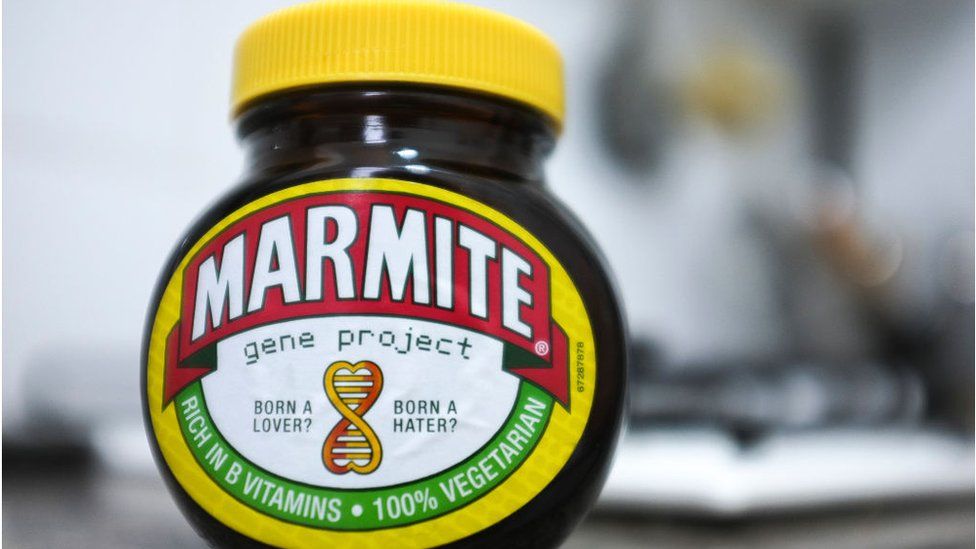Marmite maker Unilever to raise prices as costs soar
- Published
- comments

Unilever, the firm behind brands such as Marmite and Dove Soap, has said it will put up its prices again this year as its overheads continue to rise.
The consumer goods giant, which already raised prices in 2021, said the cost of some its goods would climb but it would vary from country to country.
Many firms are struggling with rising raw material, wage and energy costs.
Unilever said: "We don't want to put prices up but we're seeing the highest inflation we've seen in a decade.
"There will be price increases on some products and in some markets but it will not be uniform across the world."
Unilever, which also makes Ben & Jerry's ice cream and Hellmann's mayonnaise, said it was facing €3.5bn (£2.95bn) of extra costs in 2022 alone.
It said it expected strong growth in sales this year as it raises prices, but also forecast a sharp decline in its profit margins.
Rising cost of living
Other big firms have already revealed price rises to offset increased costs, including High Street giant Next, which said its prices would jump by up to 6% this year.
Greggs, Britain's biggest bakery chain, said it had boosted prices between 5p and 10p on items across its range of sausage rolls and cakes, while Pret a Manger is upping the price of its coffee subscription service to £25 a month from £20.
Food prices are also set to rise further, with the boss of Tesco warning supermarket prices could increase by as much as 5% by the spring.
It comes as pay rises are failing to keep up with the rise in the cost of living, recent official figures show, putting the biggest squeeze on household finances in decades.
However, the British Chambers of Commerce (BCC) also warned of a "cost-of-doing-business crisis" and called on the chancellor to help companies.
Hannah Essex, the co-executive director of the BCC, told the BBC's Today programme: "These price pressures have been building over the course of the last year, and it has now reached the point where businesses are passing that cost onto other businesses and to consumers."
It was partly due to global issues, she said, but added that there are "levers that the government can pull to make things better".
'Impossible situation'
Ms Essex called for an energy cap for smaller businesses and for the National Insurance increase set for April to be postponed for at least a year, adding that businesses could no longer absorb costs.
"It has reached the point where [firms] simply don't have a choice [but to put up prices]," she said.
She gave examples of a laundrette in Kent that has had a 250% increase in energy costs and companies seeing a 70% increase in the cost of raw materials.
According to a BCC survey of 1,000 of its members, three in four businesses are putting up their prices to cover higher costs.
The most commonly reported cost pressure was wages: 63% of firms overall - and 70% of manufacturers - reported rising wage demands causing pressure.
This was closely followed by energy costs. The survey found 62% of companies said soaring energy bills were creating pressure, while 90% of manufacturing firms said higher raw material costs were an issue.
In response to these pressures, 73% of firms said they were raising prices, while one in 20 respondents to the poll said they were considering ceasing trade completely.
Consumer price inflation is on course to rise above 7% this year, a threat that recently prompted the boss of the Bank of England to urge workers to not ask for big pay rises, to try to stop prices rising out of control.
However, a new report by recruiters said starting salaries for permanent and temporary staff were being driven up due to a scarcity of candidates.
"With competition for staff still hot, companies are having to raise pay rates for new starters to attract the best people, and the cost of living crisis means there is also more pressure from jobseekers who want a pay rise," said Neil Carberry, chief executive of the Recruitment and Employment Confederation (REC), which worked on the report with KPMG.
The Treasury said it was aware of the strains caused by higher energy bills and was in "regular contact" with business groups and energy suppliers to "see how they can best be supported".
A spokesman said the government had backed businesses through the pandemic with "unprecedented" support and would "continue to stand firmly behind them".
Are you affected by issues covered in this story? Email haveyoursay@bbc.co.uk.
Please include a contact number if you are willing to speak to a BBC journalist. You can also get in touch in the following ways:
- WhatsApp: +44 7756 165803
- Tweet: @BBC_HaveYourSay
- Upload pictures or video
- Please read our terms & conditions and privacy policy
If you are reading this page and can't see the form you will need to visit the mobile version of the BBC website to submit your question or comment or you can email us at HaveYourSay@bbc.co.uk. Please include your name, age and location with any submission.
- Published6 February 2022
- Published2 February 2022
- Published4 February 2022
- Published4 February 2022
- Published6 January 2022